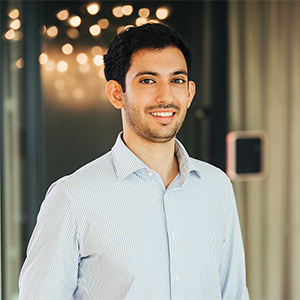Why did you choose a job in this sector/profession?
Throughout my PhD, I found myself wanting greater exposure to the latest breakthroughs across the breath of Life Sciences and Chemistry, rather than being restricted to a very niche specialism. When planning my next career step, my goal was to find one which (1) was rooted in real-world scientific applications, (2) included a commercial element, (3) had lots of variety day-to-day and (4) was intellectually stimulating. This initially felt like a tough ask. The IP sector was my first consideration as I had been involved in filing patents related to my research, which had piqued my interest in the profession. Call it fate (or luck), it quickly became clear that the profession was the perfect combination of science, law and business, which together could provide the challenging and varied experience that I craved. After speaking to a few trainee patent attorneys I knew from university about what the job entailed, I took the leap!
What attracted you to your role?
I applied for a role at Kilburn & Strode as I wanted to join a relatively large, top tier European IP firm. Joining as part of a larger cohort of trainees appealed to me in terms of settling in, training and the social element. During the application process, I got the impression that K&S was a lively, progressive firm which values it’s employees in both a professional and personal capacity. To me, this set K&S apart from some of the other top tier firms, and I have thoroughly enjoyed my time so far!
What are your main duties/roles?
My work varies greatly day-to-day. In terms of scientific fields, I’ve worked within the pharmaceutical, vaccine, antibody and food and drink industries to name a few. One thing that surprised me at the start was how many cases each trainee is responsible for at any one time. Cases are often for different clients and at different stages of the patent lifecycle. A typical day might involve any of these tasks:
- Reporting official communications from patent offices to the client
- Amending patent applications so that they conform with standard European practice
- Responding to objections to a client’s application raised by Examiners.
- Attending meetings with supervisors and clients to discuss the strategy for a particular task, or relating to business strategy.
There are also lots of social activities and sports on offer at Kilburn & Strode. I’m currently in charge of the K&S football club, and we play regularly against other law firms and businesses in the area!
Do you have any advice for anyone wanting to enter the profession?
The jump from university/research to IP can naturally seem very daunting. In addition to reading about the profession and different firms online, I strongly recommend reaching out to someone currently working at an IP firm. This could be someone you know, or alternatively through meeting someone at a careers fair. If no one springs to mind, find a firm you like, and try your luck emailing one of the trainees. Write down a list of questions and ask away – it really helps to speak to someone who has been in your shoes!
Also, some firms offer internship programs designed to give you an idea of what the day-to-day is like, with hands-on experience of real world tasks. Before joining K&S I took part in an internship program at another IP firm, which was an invaluable experience as it convinced me that I should pursue a career in IP. IP internships are also great to have on your CV – they demonstrate your interest and commitment, and having experienced the inner workings of an IP firm, this could give you an edge during interviews.






